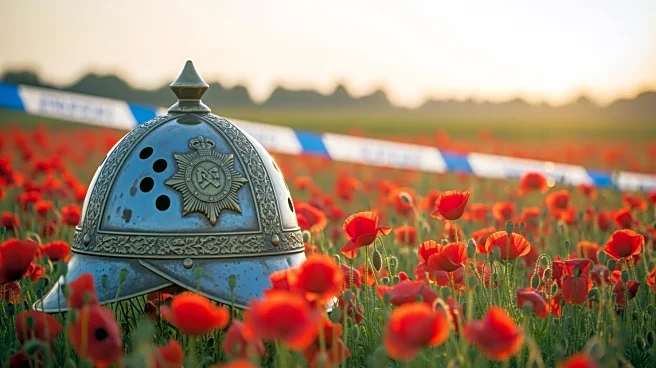What's Happening?
Ben Soppitt, a campaigner for the restoration of Commonwealth war graves in Iraq, has criticized the Commonwealth War Graves Commission (CWGC) for failing to maintain the cemeteries in Iraq. Soppitt, who is honoring his grandfather at Basra War Cemetery,
claims that the CWGC has not fulfilled its duty to honor the dead in Iraq, where more than 50,000 soldiers from the UK and Commonwealth nations lost their lives during World Wars. The graves, including those of Indian nationals, have been left unmarked after the CWGC withdrew from Iraq in the 1990s due to security concerns. Soppitt has been visiting CWGC sites in Iraq to document their condition and raise awareness about the neglect.
Why It's Important?
The neglect of war graves in Iraq highlights issues of historical commemoration and the responsibilities of international organizations like the CWGC. The failure to maintain these sites not only disrespects the memory of those who sacrificed their lives but also raises questions about the unequal treatment of soldiers based on nationality. This situation could lead to increased pressure on the CWGC to resume its work in Iraq and address the disparities in commemoration, particularly for Indian soldiers. The campaign by Soppitt may also inspire similar movements to ensure proper recognition and maintenance of war memorials globally.
What's Next?
The CWGC has promised to address the inequality in commemoration, which has favored British nationals over Indian soldiers. This commitment may lead to renewed efforts to restore and maintain the war cemeteries in Iraq. Soppitt's campaign could gain traction, potentially influencing public opinion and prompting action from the CWGC and other stakeholders. The situation may also attract attention from governments and international bodies, leading to discussions on how to better preserve historical sites and honor the sacrifices of soldiers from all nations.
Beyond the Headlines
The neglect of war graves in Iraq raises ethical questions about the responsibilities of international organizations in preserving historical sites. It also highlights cultural dimensions, as the graves of Indian soldiers have been disproportionately neglected compared to their British counterparts. This situation could lead to a broader conversation about how history is commemorated and the importance of equitable recognition for all who have served, regardless of nationality.















